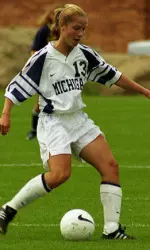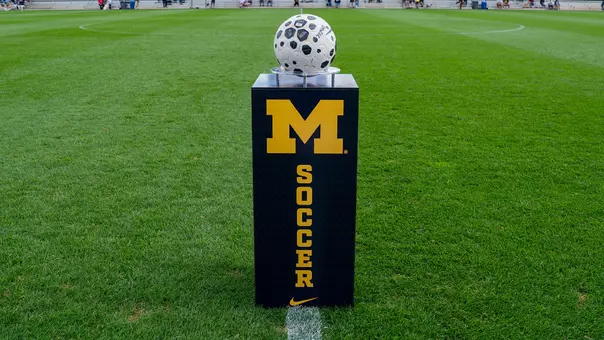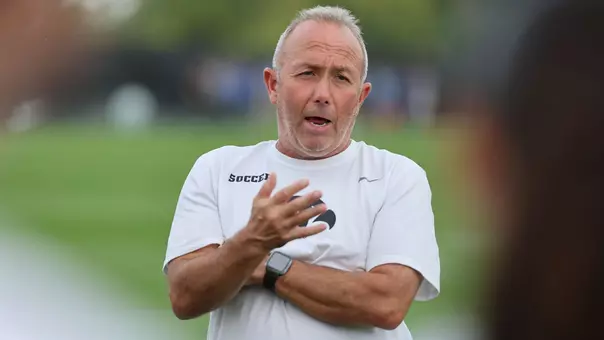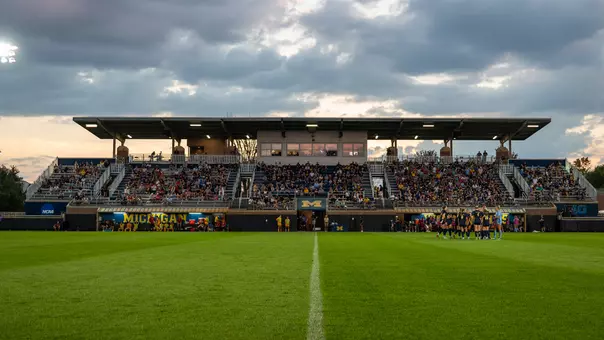
Future Friday: Q&A with Debbie (Flaherty) Cox
1/15/2016 12:00:00 AM | Women's Soccer
Jan. 15, 2016

Former women's soccer star Debbie Cox with daughters Reisa, Olivia, Evelyn, Kinley and husband Johnny.
After representing the block M with pride while they competed for the Maize and Blue, our student-athlete alumni have gone off to become professionals in different areas of their lives. Whether they continued on in their sport, helped to build up a company or started a family, they are building a future. They are building our future. As they leave the University of Michigan campus they go forth with all they learned here to create a better future for us all.
Debbie (Flaherty) Cox (1994-97) was a member of Michigan's first women's soccer team when the program began in 1994. In addition to being part of the inaugural team, Flaherty helped write the first pages of the U-M record book and added many firsts to her resume throughout her career. Flaherty helped set the bar for the program and was named a four-time team MVP (1994-97) and three-time team captain (1995-97). In 1994, she became the first Wolverine in program history to earn All-Big Ten recognition (second team), and was also named to the first team in 1995 and the second team once again in 1996. In the 1994 season opener against Wisconsin Green Bay, Flaherty scored the program's first ever goal in the 109th minute to help U-M to a 1-1 tie. She capped her career as a senior in 1997 in historic fashion, leading Michigan to its first Big Ten Tournament title and first trip to the NCAA Tournament. Flaherty finished her career with 61 career points (21G, 19A) and still ranks ninth-all-time in career points at Michigan. Academically, she was a two-time Academic All-Big Ten honoree and graduated with a general studies degree with a concentration in psychology and business from Michigan in 1998.
A native of Sutton, Massachusetts, she currently lives in Fayetteville, North Carolina, with her husband, Johnny, and their four girls -- Reisa (5), twins Olivia and Evelyn (4), and Kinley (1). After several years of coaching women's soccer at the collegiate level, she is now a stay at-home-mom, while her husband is the associate head football coach at UNC Pembroke.
Q. Bring us up to speed on your life currently -- what's new with your family, kids, job, etc.?
A. After graduating I was coaching collegiate women's soccer up until 2010 when I had my first daughter. And my husband coaches football, so we decided we couldn't do both since our seasons were at the same time so I left coaching and have been staying a home with our girls ever since. After having our first daughter, we had twin girls about 18 months later and we just recently had our fourth girl about a year and a half ago. Right now they are five, four, four and one, so that keeps us busy.
Q. You played and coached collegiately, and your husband still coaches collegiate football -- how has athletics played a role in both you, your husband's and your family's life?
A. We both absolutely love college athletics, it's our passion. I think it is the best for kids to grow up in that environment, too. Just going to games and being in the collegiate environment, and having our children look up to that is awesome. We can go to just about any games -- football, men's and women's soccer -- so we love doing that with the kids. And they love it and see it as normal.
Q. What did you major in at U-M and when did you know you wanted to become a coach?
A. I knew I wanted to do coaching around my junior at Michigan so I actually started keeping a journal of do's and don'ts. I majored in general studies because I knew I wanted to take business classes without being in the business school and that was the only way to do that. So I focused on both psychology through LS&A and business through the Ross School of Business. I kind of made a made-up business/psychology degree. I eventually went on to get my master's degree in sport and athletic administration because I thought that might be the route I wanted to take. Ultimately, I ended up pursuing my passion in coaching and I loved it.
Q. What was your time like at U-M?
A. I loved every second of it. My first semester was a little rough, but after that I knew it was the place for me. Now, looking back, it is even more special. That's the total cliché -- you don't appreciate it enough when you're there, but it's true. We knew how special of an experience we were having, but looking back it gets more and more special every year. Every year, my old teammates and I try to get together to see each other. A bunch of my friends do fall reunions back at Michigan, which I unfortunately can never make it to, but we also have a teammate that has a place in Vail, Colorado, so we get together there, which is amazing. You never lose that bond. No one quite understands it until you've lived it, but it's so special.
Q. What has been the biggest change in the coaching scene and collegiate athletics over the years?
A. I think it depends on the sport, but soccer recruiting has certainly become fast-paced. It's all year round, no dead period -- it has become quite the business -- it's nuts. I don't necessarily think that it is a good thing and I definitely won't be pushing my kids for early specialization. I still believe in playing three sports, and so does my husband. I just see kids getting burned out sooner, and specializing in one sport, and I just like the overall athlete better. My husband is the same way -- when he's recruiting for football, he loves to see the football player that is still playing basketball or another sport, so he can recruit an overall athlete and there is still room for them to grow.
Q. You were part of the first women's soccer team at Michigan in 1994 -- what was that like?
A. Like I said before, it was something where I didn't realize how special it was until now looking back. I guess it was pretty amazing, but that was also a very big reason for choosing Michigan in the first place. I thought it would be a cool experience, and not many people can say that they were part of that first team. If I had gone to an established program, would I have just been one of the ones who helped maintain it? I really wanted to be one of the ones that was creating it. Everything else about Michigan was amazing to me, but being part of that first team was a big thing for me.
Q. You were a three-time captain and four-time team MVP -- what things helped you be a successful player and leader?
A. I'd like to think that I was humble enough to know that I had weaknesses. I really did not set out to be a leader -- I tried to be fair, to be the best player, and to work the hardest -- so I feel like those characteristics kind of fell into place.
Q. You scored the first goal in program history in the inaugural game against Wisconsin Green Bay -- do you remember that game, that goal?
A. Yeah I totally remember -- it was total luck. It wasn't like I split three defenders and slotted it perfectly in the corner or anything, I just went for it way far out, and I was just like, "oh, that's going in." It was kind of anticlimactic for me because I was shocked myself. Funny enough, I actually scored the last goal of my senior year, and that goal I would say was definitely more emotional. We lost in the NCAA Tournament to Nebraska and I remember scoring the last goal of that game so those goals were kind of book ends, but that last goal stands out in my mind more than the first.
Q. What was it like leading Michigan to the NCAA Tournament for the first time in your senior year?
A. It was amazing. That last year was so emotional and I think that is why we did so well -- we realized that it was our last season. Obviously we got more and more talent as we went on so that helped big, but it was a season that we definitely appreciated. I always tried to tell my teams when I was coaching that senior year is such a special time of your life, and as much as I say to appreciate it, you can't teach someone that, only time can. There are special things across the board that all athletes feel, whether it be after your last game and you have an identity crisis and don't know what to do with your spare time. And there are things like fitness sessions you never thought you'd miss and now 10 years removed, you do miss those things. There is a common thread that all athletes, guy or girl, any level, they all go through those same feelings of "Who am I know, what am I doing?"
Q. What advice would you give to current student-athletes at Michigan, and even more specifically the women's soccer team?
A. It is so cliché, but to sit back and try to observe where they are and appreciate what they have. Now removing myself from Michigan, it was a pretty big deal to go there. Also, just to appreciate the school, the system of networks there, and just every moment -- that is what you should do throughout life as well, but especially when you are in those college days.
The 2015-16 academic year marks the 150th anniversary of Michigan Athletics. We invite the University of Michigan family to celebrate the passion that fuels us, rediscover the stories and traditions that unite us, and imagine what the future holds for us. We look forward to celebrating "This Michigan of Ours." To share a memory of Michigan Athletics, please fill out our online form or email goblue150@umich.edu.










